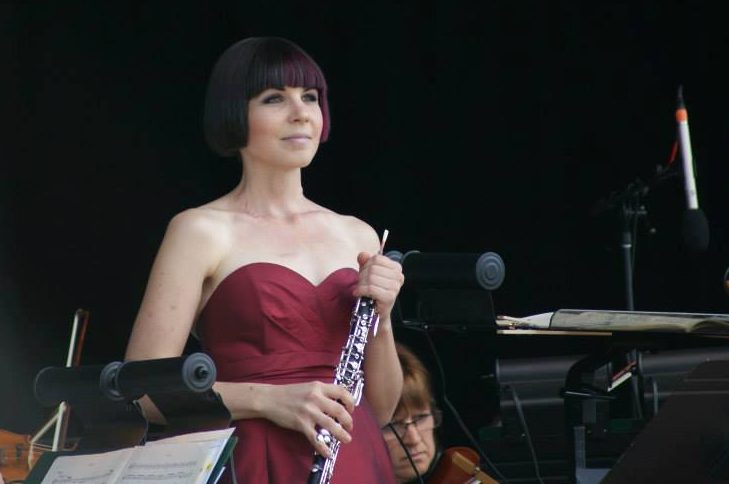
Desautels Faculty of Music alumna Bronwen Garand-Sheridan (B.Mus/2013, M.Mus/2015)
Desautels Faculty of Music alumna exploring interdisciplinary approach to Music Theory
Desautels Faculty of Music alumna Bronwen Garand-Sheridan (B.Mus/2013, M.Mus/2015) will begin the second year of her Music Theory Ph.D. program at Yale University this fall. During her studies at the Desautels Faculty of Music, where she majored in Oboe Performance, Bronwen was a Concerto Competition winner (2012) and a finalist in the faculty’s yearly Gensner Competition. She was also a winner in the annual Women’s Musical Club of Winnipeg scholarship competition (2012).
Equally proficient in performance and academic research, Bronwen presented her paper Stigmergy in the Montpellier Codex: Structure and Semantics, at the 51st International Congress on Medieval Studies in May 2016. Despite having relocated for her Ph.D. program, Bronwen remains active as a patient representative with Cancer Care Manitoba and the Canadian Partnership Against Cancer.
Desautels Faculty of Music staff caught up with Bronwen this summer to discuss her current studies and reflect on her time at the U of M.
Since graduating with your M.Mus in Oboe Performance, you have shifted your focus more to academics, specifically theory. Did you always have a passion for music theory?
I have always been very curious about how music works. Even when I was in kindergarten and starting to learn piano, I thought musical “clefs,” [treble, bass] and “keys” [i.e. “in G major”] could magically unlock music’s mysteries. I didn’t explicitly focus on these questions for a long time, and counterpoint was never my strongest subject. Throughout my time as a performer, all I wanted to do was experience music, embody music and share that with others. Now I try to translate that intuition with data and theoretical terms.
Why did you make the leap from performance to academics for your Ph.D.?
I see my academic pursuits as an outgrowth of my performance career, as well as a precursor. I have always been interested in the question of how music works. After years of playing on stage, I was engaging in multi-disciplinary dialogue with professors on how music worked, but I found myself wanting more words and terms to explain the core of my experiences. Once I started reading sources, conducting statistical analyses, and having more conversations with people in linguistics, neuroscience, and philosophy, I was hooked and came to the realization that, through academic research and publication, I could help define music, and formally express what I had learned to embody in performance.
What is your primary research focus?
My primary focus is on how music makes us feel, how music embodies mechanisms of human consciousness. Although I’m still in coursework for another year, I hope to tackle this question with neurocognitive and statistical approaches in my dissertation.
How did your time at the Desautels Faculty of Music prepare you for further studies?
There is a very laid-back and welcoming feeling at the Desautels Faculty of Music, but the standard of excellence throughout the faculty and student body is very high. The commitment to excellence was inspiring.
I really enjoyed being able to take classes outside of the Faculty of Music, like philosophy, biomedical ethics, cultural anthropology, etc. I also really appreciated that the Faculty is very flexible. They offered me the opportunity to write a research paper instead of a second year recital and I was able to throw myself into the world of academics.
At the University of Manitoba, I was inspired by a great variety of teachers both within the performance and academic tracks. They each helped me in their unique ways, and gave me the hope that I can do the same for others in the future.






